Madhusudan Dutta: The writer who played with the gods

"Am I not preparing for the great object of embellishing the tongue of my fathers?" he had said and when his time came, he kept his promise. He did not just embellish, he redefined Bangla language and literature. Indeed, he is none other than Michael Madhusudan Dutta.
Hailed as the first modern poet and the first rebel poet of Bangla literature, Madhusudan's rebellion against the conservative society and the contemporary style of literature was daring and the first step towards modern Bangla literature.
Chasing a dream
Learning English from an early age, his command over the language grew before long. As did his infatuation, enough to lure him into the daring idea that he would compose poems in English. Not only that, he was brave enough to send his compositions to English newspapers for publication and dedicating these pieces to the likes of Byron.
As his biographers note over and over again, Madhusudan is nothing if not daring. Even though these poems were never published, they were a good start for Madhusudan and eventually he ended up composing his only notable work in English, Captive Ladie.
Captive Ladie is the composition of a promising writer who is destined for greatness and it shows. It still remains one of the most considerable verses produced in English by a Bengali writer. But Madhu's path towards English literature ends here.
The prodigal son
Eventually Madhusudan landed in the vast field of Bangla literature. Why he opted to writing in Bangla from English and what influenced it; that's a heavy topic and requires a long and different discussion. Naturally, as any skilled craftsman would do, he reshaped everything. He is the first modern poet in Bangla literature and certainly the personification of Bangla renaissance.
It's appalling how Madhusudan is still overlooked. Just like he was ignored after his death. It took 15 years after his death for someone to actually write about him. This aversion to Madhusudan is sad and says a lot about our society.
Why is that? Is it because he converted to Christianity? Or is it because his entire existence and values were not approved of by the contemporary society? It's a question that we still debate but none of these changes the fact that Madhusudan's literary work is stupendous. And at the risk of backlash, dare I say that his work is only second to perhaps Rabindranath Tagore.

Without taking his other works in consideration, The Slaying of Meghnada (Meghnad Badh Kavya) alone is an absolute ground-breaking work that still stands as the defining landmark of renaissance in Bangla Literature.
As a true polyglot, Madhusudan studied English, Bengali, Hebrew, Latin, Greek, Tamil, Telugu, Sanskrit and he spoke a few more including French, Italic, and German. The effects of this are notably obvious in his work. Madhusudan was the first who had the vision to fuse western ideas and styles into Bangla literature. He was very interested in mythology and took the liberty to use mythological style and incorporate them into his writing. In this regard, he took inspirations from the likes of Homer. This was not only bold but requires tremendous knowledge and vision that only Madhusudan possessed at that time.
He was also the first one to realise that there are enough stories in the Muslim sources to compose an epic. A Bengali play on the Muslim Queen "Rizia" was in the back of his mind. It's a shame we never got to see the result.
Burning like a comet
Unfortunately, his prime lasted only a couple of years. "I shall come out like a tremendous comet" is what he said and he did exactly that. Most of his notable works came within the short span of those few years during the period of 1858-62. Meghnad Badh Kavya was published in 1861 securing his place at the zenith of Bangla literature.
His collection of Bangla sonnets was published in 1866 and Maya Kannan, which is his final play was published in 1872. 'The Slaying of Hector' remains incomplete. Like a comet, Madhusudan had burned as brightly as he could and now it was time for the inevitable.
Human after all
Genius as he was, his personal life was plagued like any ordinary person. Whether it was because of his conversion or because of his decadence, lady luck did not seem to favour him. And it certainly did not help that his spending habits were much greater than his earnings.
Madhusudan Dutta still does not get the respect that he deserves. Since his demise, there has been very little contribution in blank verse and free verse. As interesting as sonnets are, they are still quite alien in our literature except Madhusudhan's work.
Spendthrift, arrogant, renegade, drunkard — use whatever adjective you want to describe him. In Bangla literature, Madhusudan Dutta is nothing short of a legend.



 For all latest news, follow The Daily Star's Google News channel.
For all latest news, follow The Daily Star's Google News channel.
Comments